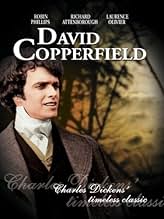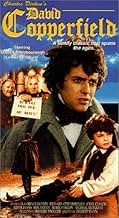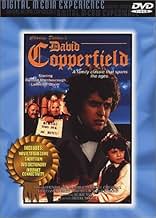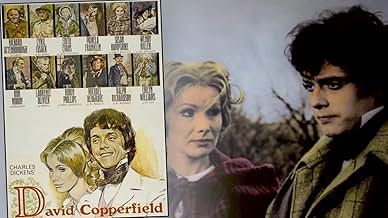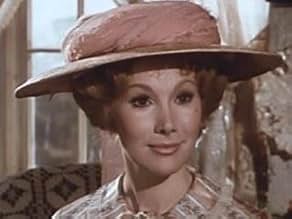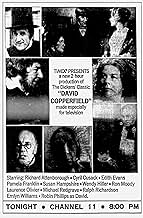Aggiungi una trama nella tua linguaThe legendary novel by Charles Dickens comes to life in this colorful interpretation directed by Delbert Mann.The legendary novel by Charles Dickens comes to life in this colorful interpretation directed by Delbert Mann.The legendary novel by Charles Dickens comes to life in this colorful interpretation directed by Delbert Mann.
- Regia
- Sceneggiatura
- Star
- Candidato a 3 Primetime Emmy
- 4 candidature totali
Recensioni in evidenza
This was never one of my favourite Dickens stories - I always found the title character just a bit , well, wet! Anyway, the really quite mediocre Robin Phillips take the role for this adaptation, and we follow his rather brutal adventures of childhood and early adulthood that see him deal with bullying, beating, extortion and tragedy. As with the book, to which this is fairly faithful, there are quite literally heaps of curious and engaging characters he encounters along the way, most notably Sir Ralph Richardson's wonderfully over the top "Micawber", Sir Michael Redgrave's "Peggotty" desperately seeking his errant daughter "Emily" (Sinéad Cusack) and from Ron Roody as the duplicitous, downright nasty piece of work that is "Uriah Heap"! The production is pretty lacklustre. The photography offers us lots of long, moody shots of the contemplative hero on the beach - and the cameraman seems content to try out his new zoom lens just once (or thrice) too often. Malcolm Arnold provides us with an unremarkable score and the whole story irather plods along without much potency. As an introduction to the work of Dickens, it might have a purpose in diverting the viewer to the author's (and his other, better) novels, but a piece of cinema it's little better than a very well cast television movie.
I found this DVD at the dollar store, where it was, if you can believe it, on sale at 50 cents. You wouldn't expect much and I wasn't disappointed at what I got.
Although there are some sparkling portrayals, the movie was long, muddy, and hard to watch. Some of this had to do with the poor reproduction by the distributor, Digiview. The rest related to the fact that I hadn't read the book so the 101 story lines going off in all directions were confusing, especially when held together only by the title character walking up and down the beach, and alternately scowling and muttering.
Worth every cent ... and not a pence more.
Although there are some sparkling portrayals, the movie was long, muddy, and hard to watch. Some of this had to do with the poor reproduction by the distributor, Digiview. The rest related to the fact that I hadn't read the book so the 101 story lines going off in all directions were confusing, especially when held together only by the title character walking up and down the beach, and alternately scowling and muttering.
Worth every cent ... and not a pence more.
Delbert Mann's TV movie of David Copperfield is unique among film adaptations in that it tells the entire story from a series of flashbacks rather than an ongoing narrative. It works extremely well, adds to the emotional punch of the entire story, further illuminates Dickens' wonderful characters and is aided by a haunting musical score by composer Malcolm Arnold.
It also boasts a pretty fabulous cast including Dame Edith Evans, Susan Hampshire, Richard Attenborough, Ron Moody, Wendy Hiller, Lawrence Olivier and Sir Ralph Richardson; a veritable who's who of the finest British actors of the 20th century! Some have commented that Robin Phillips is bland as the title character. I couldn't disagree more. He is certainly the most cerebral, tortured David in any of the adaptations and also cuts a handsome figure in the movie. In short, he's splendid.
Now to the currently available DVD quality. I certainly agree that it is not good. The colors are a bit washed out, there is some clipped editing and a few moments of nasty film print. That being said, it is far from being unwatchable as some others have suggested. The musical soundtrack comes through fine and the dialogue is clear. And as much as I would welcome a digital restoration of the film, it's TV origins suggest that this would be unlikely.
Frankly, having the movie on DVD at a bargain price is blessing enough. I highly recommend it to those interested in an outstanding version of the story and willing to put up with technical imperfections.
It also boasts a pretty fabulous cast including Dame Edith Evans, Susan Hampshire, Richard Attenborough, Ron Moody, Wendy Hiller, Lawrence Olivier and Sir Ralph Richardson; a veritable who's who of the finest British actors of the 20th century! Some have commented that Robin Phillips is bland as the title character. I couldn't disagree more. He is certainly the most cerebral, tortured David in any of the adaptations and also cuts a handsome figure in the movie. In short, he's splendid.
Now to the currently available DVD quality. I certainly agree that it is not good. The colors are a bit washed out, there is some clipped editing and a few moments of nasty film print. That being said, it is far from being unwatchable as some others have suggested. The musical soundtrack comes through fine and the dialogue is clear. And as much as I would welcome a digital restoration of the film, it's TV origins suggest that this would be unlikely.
Frankly, having the movie on DVD at a bargain price is blessing enough. I highly recommend it to those interested in an outstanding version of the story and willing to put up with technical imperfections.
Delbert Mann's version of David Copperfield is one of these lavish all star adaptations made for the network American television market. Laurence Olivier and Richard Attenborough just turn up for a few scenes.
Mann should be applauded for attempting to try a different approach to this often adapted story. It is told in flashback by an adult Copperfield who reflects in his life and relationships. It also shies away from the traumatic abuse David suffers from the Murdstones and the boarding school he attends. So credit should be given for avoiding the poverty porn which some directors would had gone full board on, although this may be part of the censorship that existed at the time in US network television.
However it is too truncated leaving me dissatisfied to a story that has been shredded. Some actors look too old for the parts they are playing such as Ron Moody as Uriah Heep and Ralph Richardson as Mr Micawber. It does not help that Robin Phillips is bit bland as the lead and comes across as a bit of a wet fish.
The version of the film I saw was of poor quality, it was in desperate need of restoration. A shame given that the film has theatrical knights/dames such as Olivier, Redgrave, Richardson, Attenborough, Hillier, Evans.
Mann should be applauded for attempting to try a different approach to this often adapted story. It is told in flashback by an adult Copperfield who reflects in his life and relationships. It also shies away from the traumatic abuse David suffers from the Murdstones and the boarding school he attends. So credit should be given for avoiding the poverty porn which some directors would had gone full board on, although this may be part of the censorship that existed at the time in US network television.
However it is too truncated leaving me dissatisfied to a story that has been shredded. Some actors look too old for the parts they are playing such as Ron Moody as Uriah Heep and Ralph Richardson as Mr Micawber. It does not help that Robin Phillips is bit bland as the lead and comes across as a bit of a wet fish.
The version of the film I saw was of poor quality, it was in desperate need of restoration. A shame given that the film has theatrical knights/dames such as Olivier, Redgrave, Richardson, Attenborough, Hillier, Evans.
According to IMDb, there have to date been 388 film and television adaptations of books by Charles Dickens, but the treatment of his works has been very uneven. A remarkably high proportion of those adaptations are based (sometimes very loosely) upon his novella "A Christmas Carol", which seems to inspire at least one film every festive season, and many of the others are derived from either "Oliver Twist" or "Great Expectations". Although "David Copperfield" is one of Dickens's best-known novels, it has proved less popular, at least in the cinema. (There have been a number of TV adaptations). To the best of my knowledge the 1935 version with Freddie Bartholomew and W.C. Fields, which I have never seen, remains the only feature-film version since the coming of sound. This version from 1970 is of feature-film length but was made for television.
"David Copperfield" is often described as an "autobiographical novel", and some of David's experiences, such as his time in the bottling factory and the fact that he eventually becomes a writer, do indeed reflect the author's own. Indeed, it is said that Dickens deliberately gave his hero his own initials, albeit reversed. In one important respect, however, it is not autobiographical. Dickens was 39 when his father died, and his mother only predeceased him by seven years. David's father, however, dies before he is even born, and his mother dies while he is still a boy. It is notable that a number of Dickens's other heroes, such as Oliver Twist and Pip in "Great Expectations" are also orphans. I wonder what psycho-analysts would make of this fact.
The plot is a complex one, and I will not try to summarise it in this review. The film-makers try and keep most of the main features of the novel, but even so there are some odd gaps. One minute, for example, David is a child, a penniless vagabond who has just run away from the bottling factory in search of his aunt (his last surviving relative), the next he is not only an adult but also, it would seem, a young man of some means and social standing, and it is never explained how this transformation has taken place. Although Mr Micawber (a character said to be based upon Dickens's father) appears, the episode in which he is imprisoned for debt is cut from the film, so he never comes across as the improvident spendthrift described by Dickens.
The cast includes some of the leading British actors of the period, such as Laurence Olivier, Richard Attenborough and Edith Evans, mostly in cameo roles. Michael Redgrave has a more substantial role as Daniel Peggotty, as does Ralph Richardson as Micawber. Some on this board have described Robin Phillips (an actor I have not come across in any other films) as "dull", but I thought he made David a very personable young man. There are good performances from Pamela Franklin as the beautiful but empty-headed Dora and from Redgrave's son Corin as Steerforth, but Ron Moody never makes the same impression as Uriah Heep as he had done playing another Dickensian villain, Fagin in "Oliver!" which had appeared a couple of years previously. Susan Hampshire's Agnes is rather colourless, but the fault here probably lies with the author rather than the actress. Dickens's virtuous young heroines are never his most convincing creations.
Dickens' story is a good one, which can stand a certain amount of rough treatment at the hands of film-makers, which is why I have given this version an above-average mark. It does, however, confirm my view that Dickens is not the most cinematic of authors. There is a reason why so few feature films have been based upon this and some of Dickens's other novels. They are so long and so packed with incidents and characters that there is just not room to do them justice in the traditional two-hour (or two-and-a-half-hour) slot. "Oliver Twist" and "Great Expectations" are, relatively speaking, shorter and simpler, which is why they tend to be exceptions to the rule. His longer novels tend to work better as television mini-series, and a number of very good Dickens adaptations have been made in this format, particularly by the BBC. 6/10
"David Copperfield" is often described as an "autobiographical novel", and some of David's experiences, such as his time in the bottling factory and the fact that he eventually becomes a writer, do indeed reflect the author's own. Indeed, it is said that Dickens deliberately gave his hero his own initials, albeit reversed. In one important respect, however, it is not autobiographical. Dickens was 39 when his father died, and his mother only predeceased him by seven years. David's father, however, dies before he is even born, and his mother dies while he is still a boy. It is notable that a number of Dickens's other heroes, such as Oliver Twist and Pip in "Great Expectations" are also orphans. I wonder what psycho-analysts would make of this fact.
The plot is a complex one, and I will not try to summarise it in this review. The film-makers try and keep most of the main features of the novel, but even so there are some odd gaps. One minute, for example, David is a child, a penniless vagabond who has just run away from the bottling factory in search of his aunt (his last surviving relative), the next he is not only an adult but also, it would seem, a young man of some means and social standing, and it is never explained how this transformation has taken place. Although Mr Micawber (a character said to be based upon Dickens's father) appears, the episode in which he is imprisoned for debt is cut from the film, so he never comes across as the improvident spendthrift described by Dickens.
The cast includes some of the leading British actors of the period, such as Laurence Olivier, Richard Attenborough and Edith Evans, mostly in cameo roles. Michael Redgrave has a more substantial role as Daniel Peggotty, as does Ralph Richardson as Micawber. Some on this board have described Robin Phillips (an actor I have not come across in any other films) as "dull", but I thought he made David a very personable young man. There are good performances from Pamela Franklin as the beautiful but empty-headed Dora and from Redgrave's son Corin as Steerforth, but Ron Moody never makes the same impression as Uriah Heep as he had done playing another Dickensian villain, Fagin in "Oliver!" which had appeared a couple of years previously. Susan Hampshire's Agnes is rather colourless, but the fault here probably lies with the author rather than the actress. Dickens's virtuous young heroines are never his most convincing creations.
Dickens' story is a good one, which can stand a certain amount of rough treatment at the hands of film-makers, which is why I have given this version an above-average mark. It does, however, confirm my view that Dickens is not the most cinematic of authors. There is a reason why so few feature films have been based upon this and some of Dickens's other novels. They are so long and so packed with incidents and characters that there is just not room to do them justice in the traditional two-hour (or two-and-a-half-hour) slot. "Oliver Twist" and "Great Expectations" are, relatively speaking, shorter and simpler, which is why they tend to be exceptions to the rule. His longer novels tend to work better as television mini-series, and a number of very good Dickens adaptations have been made in this format, particularly by the BBC. 6/10
Lo sapevi?
- QuizReleased as a theatrical movie in Europe, this premiered as an NBC television special in the U.S.
- Citazioni
Mr. Quinion: You can sleep in yer own time! This is Mr Micawber. You're to lodge with him.
Mr. Micawber: Under the impression that your peregrinations in this metropolis have not as yet been extensive, allow me to assist you in penetrating this modern Babylon as far as my lodgings in the City Road...
- Curiosità sui creditiCredits look like the original illustrations by Phiz, but are in fact pastiches by Mel Isaacson using the faces of the actors in their roles.
- ConnessioniReferenced in Cinema: Sir Laurence Olivier (1970)
I più visti
Accedi per valutare e creare un elenco di titoli salvati per ottenere consigli personalizzati
Dettagli
- Data di uscita
- Paese di origine
- Lingua
- Celebre anche come
- Charles Dickens' David Copperfield
- Luoghi delle riprese
- Aziende produttrici
- Vedi altri crediti dell’azienda su IMDbPro
- Tempo di esecuzione1 ora 58 minuti
- Mix di suoni
- Proporzioni
- 1.33 : 1
Contribuisci a questa pagina
Suggerisci una modifica o aggiungi i contenuti mancanti

Divario superiore
By what name was David Copperfield (1970) officially released in Canada in English?
Rispondi
